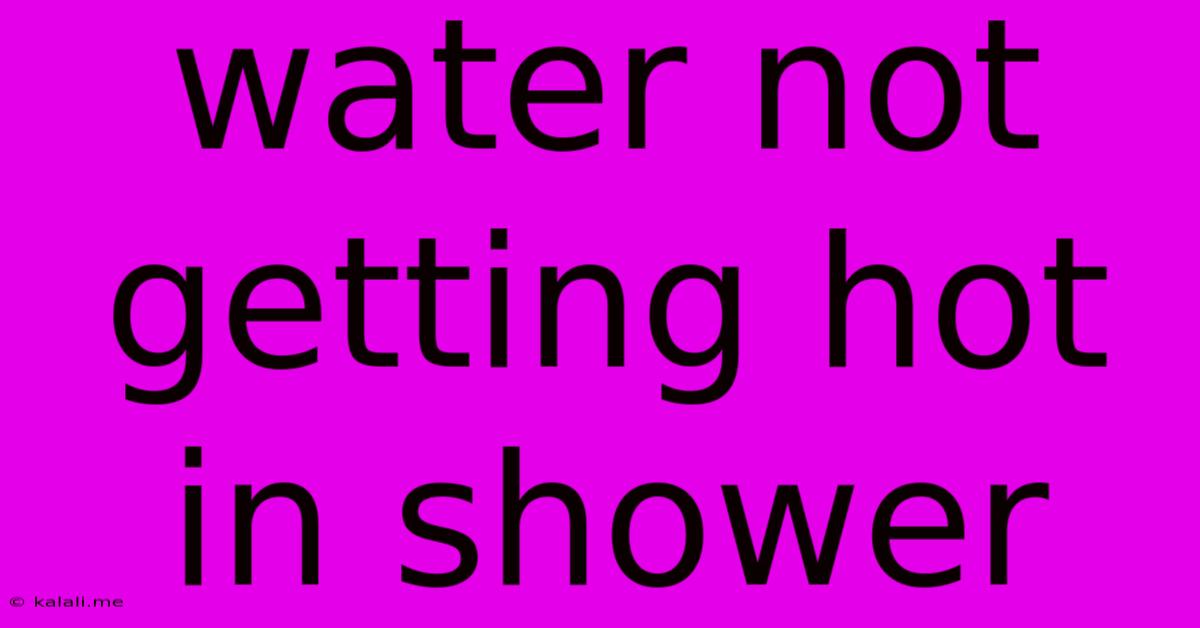Water Not Getting Hot In Shower
Kalali
Jun 06, 2025 · 3 min read

Table of Contents
Water Not Getting Hot in the Shower? Troubleshooting Common Causes
Is your shower turning into an icy Arctic experience? A cold shower is never fun, and figuring out why your hot water isn't working can be frustrating. This guide will walk you through common causes of low hot water pressure in your shower and provide solutions to get you back to enjoying a warm, relaxing shower.
Why is my hot water not working in the shower? This is a common plumbing problem with various potential causes, ranging from simple fixes to more complex issues requiring professional assistance. We'll cover everything from simple checks to more involved troubleshooting steps.
1. Check the Hot Water Heater
The most obvious culprit? Your water heater itself. Before you start checking anything else, ensure your water heater is:
- Turned on: Seems obvious, but sometimes the breaker trips or a gas valve gets accidentally turned off.
- Producing hot water: Check a hot water tap elsewhere in your house. If no other hot water is available, the problem lies with the water heater itself. This might require a repair or replacement, depending on the issue (e.g., a malfunctioning heating element, thermostat problem, or low water level).
- Sufficient water level: A low water level can hinder heating efficiency. Consult your water heater's manual to determine the appropriate level.
- Properly vented: Blocked vents can prevent proper operation and potentially create safety hazards. If you suspect a vent problem, call a qualified plumber.
2. Investigate the Shower Fixture
The showerhead and associated valves can also be problematic. Here's what to examine:
- Check the showerhead: Mineral buildup can restrict water flow and reduce hot water. Try removing the showerhead and cleaning it thoroughly. Soaking it in vinegar can help dissolve mineral deposits. Inspect the showerhead for any signs of clogging. A new showerhead may be necessary if cleaning doesn't resolve the issue.
- Examine the shower valve: A faulty mixing valve can impede hot water delivery. Listen carefully for any unusual sounds – grinding, humming, or whistling – which could indicate a malfunctioning valve. Replacing a faulty shower valve is often a straightforward DIY project, but if you're unsure, calling a plumber is recommended.
- Low water pressure throughout the house: If you're experiencing low hot water pressure in other fixtures, the issue isn't isolated to your shower. This suggests a broader plumbing problem, perhaps a problem with your main water supply. You might need to consult a professional to investigate this further.
3. Consider Water Pressure Issues
Low water pressure can reduce hot water flow. Check if the problem is isolated to the shower or affects other fixtures. Factors to consider include:
- Sediment buildup: Over time, sediment can accumulate in your pipes, reducing flow. A professional plumber can flush your lines to remove accumulated sediment.
- Pipe corrosion: Old or corroded pipes can severely restrict water flow. If this is suspected, you might need significant plumbing repairs or even pipe replacement.
- Water main issues: Low water pressure from the city’s main water supply is beyond your control, but you can contact your water company to report any issues.
4. When to Call a Plumber
While many issues can be tackled with DIY solutions, some problems require professional help. Contact a plumber if:
- You suspect a significant plumbing problem beyond your expertise.
- You’re uncomfortable working with plumbing fixtures or gas appliances.
- The problem persists after trying basic troubleshooting steps.
Getting your hot water back is crucial for comfort and convenience. By systematically checking these potential causes, you'll be well on your way to resolving the issue and enjoying warm showers once more. Remember safety first! If you're unsure about any step, don't hesitate to call a qualified plumber.
Latest Posts
Latest Posts
-
What Is The Round Thing On My Ceiling
Jun 06, 2025
-
Create 4 Input Nand Using Two Input Nand Gates
Jun 06, 2025
-
How To Fix A Door Knob Hole
Jun 06, 2025
-
How To Protect A Pvc Drain Pipe Behind Drywall
Jun 06, 2025
-
Solving A System Of Differential Equations
Jun 06, 2025
Related Post
Thank you for visiting our website which covers about Water Not Getting Hot In Shower . We hope the information provided has been useful to you. Feel free to contact us if you have any questions or need further assistance. See you next time and don't miss to bookmark.